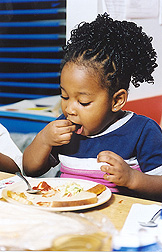Hey Mom, What’s for Dinner? Parents’ Feeding Styles May Affect Kids’ Obesity
|
|
OK. Admit it.
You all too often find yourself serving your kids or grandkids those deliciously rich, high-calorie foods that they love—at the expense of healthful foods that they don’t.
If this describes you, welcome to the club of people who have what nutrition researcher Sheryl O. Hughes and colleagues might classify as an “indulgent” feeding style.
Hughes is based at the ARS Children’s Nutrition Research Center at Baylor College of Medicine in Houston, Texas, where she’s an assistant professor of developmental psychology. She is taking a close look at the feeding styles of parents and other caregivers to learn more about how these styles influence a 3- to 5-year-old’s attitudes toward food and eating and affect childhood obesity.
“If we know more about the feeding styles in these formative years and their relation to childhood obesity,” says Hughes, “then we may be better able to intervene, retrain parents and kids, and help stop the childhood obesity epidemic.”
Right now, 32 percent of children and adolescents in the United States are overweight or obese.
Hughes is examining two “permissive” feeding styles—“indulgent” and the nutritionally neglectful “uninvolved”—and two styles that offer more structure—“authoritarian” (a highly controlling approach in which kids are given no choices) and “authoritative” (parents choose what’s served, but kids choose what’s eaten).
In one early study, Hughes and colleagues worked with data from 718 low-income Black, White, or Hispanic parents of 3- to 5-year-old preschoolers in Texas and Alabama. Parents filled out
Hughes’s feeding-styles questionnaire. Kids’ heights and weights were measured to determine their BMI, or body mass index—an indicator of body fatness.
Among other findings, the team determined that the “indulgent” feeding style was significantly associated with higher child BMI. Hughes, along with Theresa A. Nicklas of the Houston center and other co-investigators, documented the study in a 2008 article in the Journal of Developmental and Behavioral Pediatrics.
Hughes also collaborated in another analysis of data from the same volunteers. For that study, led by Michigan State University nutrition researcher Sharon O. Hoerr, scientists scrutinized the relation between feeding styles and how much of a given type of food kids ate—between 3 p.m. and bedtime—on three different days.
In an article published in 2009 in the International Journal of Behavioral Nutrition and Physical Activity, the scientists report that kids whose parents’ feeding styles were either “indulgent” or “uninvolved” ate the least fruit, 100-percent-fruit juice, vegetables, or dairy foods, as compared to kids whose parents had “authoritarian” feeding styles. Ironically, the least-eaten foods were those that experts agree are the most helpful for weight management, Hughes notes.
While the authoritarian feeding style may not necessarily be the best choice in every parenting situation and for every age group, the scientists point out that some level of parental control—whether from the authoritarian style or the more balanced and nurturing authoritative approach—seems to be needed to help preschoolers eat what’s healthful for them and to manage their weight.
The studies are among the most extensive of their kind for this demographic. If heeded, the research may help shape meal-time parenting across America for the better.—By Marcia Wood, Agricultural Research Service Information Staff.
This research is part of Human Nutrition, an ARS national program (#107) described at www.nps.ars.usda.gov.
Sheryl O. Hughes is with the USDA-ARS Children’s Nutrition Research Center at Baylor College of Medicine, 1100 Bates St., Houston, TX 77030; (713) 798-7017.
"Hey Mom, What’s for Dinner? Parents’ Feeding Styles May Affect Kids’ Obesity" was published in the March 2010 issue of Agricultural Research magazine.







